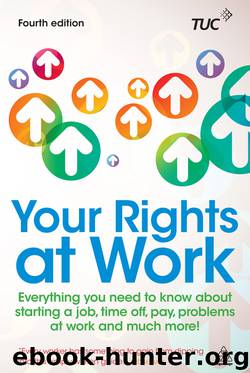Your Rights at Work by The TUC

Author:The TUC [TUC, The]
Language: eng
Format: epub
Publisher: Kogan Page
Published: 0101-01-01T00:00:00+00:00
A move too far?
Mr Aslam worked for a bank in Leeds on a low salary. His contract contained a clear mobility clause that stated that he could be transferred to any of the bank’s workplaces in the UK. Mr Aslam was told to move to the bank’s Birmingham branch without notice but he refused on both financial and personal grounds (he was offered no relocation expenses, and his wife had just suffered a miscarriage). The bank asserted that it had a clear right to insist on the transfer under the express mobility clause of Mr Aslam’s contract. He resigned, claimed constructive dismissal and won.
The employer argued that they had simply invoked an explicit clause of the contract, but this was rejected. The EAT ruled that employers still have to meet the implied terms in any contract, and in particular when dealing with mobility clauses: reasonable notice must be given before exercising the power to transfer an employee; a mobility clause must be operated in a way to make it feasible (an employee should not be required to do something that was, in practice, impossible). Also, a mobility clause is subject to a general duty not to behave in a way likely to destroy mutual trust and confidence between employer and employee.
In the same way that an employer is not entitled to apply a rule in any way they want, they are similarly not entitled to insist on a contractual right in any way they want. In both cases there is a duty of reasonableness.
Download
This site does not store any files on its server. We only index and link to content provided by other sites. Please contact the content providers to delete copyright contents if any and email us, we'll remove relevant links or contents immediately.
Tools of Titans by Timothy Ferriss(8393)
Change Your Questions, Change Your Life by Marilee Adams(7780)
Deep Work by Cal Newport(7083)
Playing to Win_ How Strategy Really Works by A.G. Lafley & Roger L. Martin(6303)
Man-made Catastrophes and Risk Information Concealment by Dmitry Chernov & Didier Sornette(6019)
Big Magic: Creative Living Beyond Fear by Elizabeth Gilbert(5771)
Digital Minimalism by Cal Newport;(5764)
Ego Is the Enemy by Ryan Holiday(5447)
The Slight Edge by Jeff Olson(5417)
The Motivation Myth by Jeff Haden(5212)
The Laws of Human Nature by Robert Greene(5208)
Stone's Rules by Roger Stone(5087)
Tuesdays with Morrie by Mitch Albom(4784)
Eat That Frog! by Brian Tracy(4538)
Rising Strong by Brene Brown(4459)
Skin in the Game by Nassim Nicholas Taleb(4248)
The Money Culture by Michael Lewis(4207)
Bullshit Jobs by David Graeber(4190)
Skin in the Game: Hidden Asymmetries in Daily Life by Nassim Nicholas Taleb(4006)
